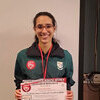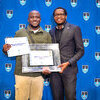A win for books at the 2023 UCT Annual Staff Awards
27 December 2023 | Story Nicole Forrest. Photo iStock. Read time 7 min.
Each year, the University of Cape Town (UCT) Book Award honours members of staff who have produced outstanding publications that bring credit to the institution. At this year’s award ceremony, which took place on 23 November, the 2022 and 2023 awards were handed to recipients for both years.
Nominees for the UCT Book Award are put forward by members of the university community, who are encouraged to submit publications they believe to be noteworthy. Works of various types, including monographs, textbooks, novels, collections, and popular writing are eligible for consideration by the UCT Book Award Committee.
The honour for 2022 went to the head of UCT’s Department of Psychiatry and Mental Health, Professor Dan Stein, for his volume, Problems of Living: Perspectives from Philosophy, Psychiatry, and Cognitive-Affective Neuroscience. The 2023 award was presented to Dr Mignonne Breier, honorary research associate at UCT’s School of Education, for her book Bloody Sunday: The Nun, The Defiance Campaign and South Africa's Secret Massacre.
The Meritorious Book Prize 2023 was also presented at the ceremony. The prize recognises specialist subject books that merit acknowledgement for their contribution as well as first books by authors who deserve special recognition and support. It was awarded to Associate Professor Barbara Boswell for her book, And Wrote My Story Anyway: Black South African Women’s Novels as Feminism.
At the intersection of psychiatry and philosophy
Professor Stein’s Problems of Living encourages readers to seek purpose in their lives and find a balance between overly optimistic Panglossian and unremittingly pessimistic views of life. It underlines how much we still have to learn about human nature and the world, emphasises that answers to the “big questions” and “hard problems” of living can only be partial and tentative, and nevertheless encourages readers to persist in trying to live meaningful lives.
For Stein, the publication is the culmination of years of work related to addressing a variety of interrelated issues that arise in psychiatry, philosophy, and neuroscience.
“More than a decade ago, I published a volume, Philosophy of Psychopharmacology. I was trying to get my head around conceptual issues at the interface of philosophy and psychiatry, and I thought that psychiatric medications were an interesting thing with which to think,” he said.
“There’d been growing interest in whether such medicines were over-prescribed or under-prescribed, and in the question of ‘cosmetic psychopharmacology’; in other words, using such agents for enhancement rather than for treatment.
“The current volume allowed me to expand from a narrower focus on the ‘hard problems’ faced by mental health clinicians in their work, to the broader issue of the ‘hard problems’ raised for everyone by life as a whole.”
A guide for living a better life
Imbued with Stein’s deep understanding of a range of different disciplines – he studied medicine due to his interest in both science and the humanities, and has doctorates in both clinical neuroscience and philosophy – Problems of Living has the potential to bridge conversations between philosophers, mental health clinicians and neuroscientists.
The volume certainly has the power to influence and change practical approaches to mental health for the better.
“Psychiatry is partly a field that deals with serious mental conditions, but it’s also partly a field that overlaps with questions addressed in self-help books – how to live in better, wiser, healthier ways,” he said.
“In some ways, the volume can be conceptualised as a self-help book for academics with an interest in disciplines such as psychiatry, philosophy and neuroscience. Questions about optimism versus pessimism strike me as crucial and it seems to me that a balanced approach to answering such questions is useful.”
Award-winning insights into South Africa’s past
Like Problems of Living, Dr Breier’s book, Bloody Sunday, also asks readers to strike a balance between optimism and pessimism. In this instance, in the recounting of the events of a massacre that took place on 9 November 1952, in Duncan Village, East London, the author calls one to reconsider and reflect on this tragedy so that we can build “a better understanding of our politics today and to avoid repeating the mistakes of our past”.
“There are many similarities between conditions in Duncan Village in 1952 and those in some parts of that township – and many others – today. There is a similar gap between the ruling elite and the young people who are out of work and hope,” explained Breier.
“My book reminds us how important it is – but how difficult we find it – to talk about events where we or our ancestors were not victims but perpetrators of atrocities. Here I am referring to all sides of the conflict in 1952, as well as today.”
Breier’s thoughtful and deep exploration of the events which unfolded on the day in question have earned her the 2022 Sunday Times Literary Award for Non-Fiction. The work was also shortlisted for the 2022 National Institute of Humanities and Social Sciences Non-Fiction Award.
Investigating a forgotten tragedy
Bloody Sunday was, in part, inspired by Breier’s concern about the secrecy surrounding the event.
“Until recently, few people outside of the Eastern Cape have known of the events in Duncan Village, East London, on 9 November 1952 – what I call South Africa’s ‘Bloody Sunday’. I grew up in the Eastern Cape and as a child I learned from my mother that an Irish nun was killed that day by residents of the township where she lived and worked as a medical doctor. My mother did not tell me that many black people were also killed that day, by the police,” Breier explained.
“Many decades later, I learned the name of the nun – Sister Aidan Quinlan (or Dr Elsie Quinlan) – and became determined to find out what really happened that day, why the events were covered up by both sides and why they have been largely ignored in histories of that period.
“I set out to write a book that would present both sides of the conflict in a form accessible to general as well as academic readers. The book braves difficult topics, including the mutilation of the nun’s body and the extent and cover-up of the police massacre, which my research indicates had a higher death toll than Sharpeville.”
Giving a voice to empowering voices
Associate Professor Boswell’s aptly named And Wrote My Story Anyway also delved into South Africa’s history. Her work explores how 10 black female authors’ writings have contributed to discourses of family, race and nation, and their reframing of female subjectivity in our country.
The conferral of the Meritorious Book Prize is particularly sweet for Boswell, as she set out to write the work because there was almost no literature on this particular subject matter when she was completing her PhD in Women’s Studies.
“This book started as my PhD dissertation many years ago. It took over 10 years to write because I first had to write it as a dissertation and then as a monograph. I was inspired to write it because it is the book I wanted to read, but couldn’t find anywhere,” she explained.
“I feel honoured and humbled to have my work recognised in this way by my peers, especially because this scholarship deals with the systematic erasure of black women’s intellectual legacies. Having this book recognised means that black women’s writing and literary histories are being surfaced in a new way.”
In addition to And I Wrote My Story Anyway, Boswell has published a book on author Lauretta Ngcobo. She also has two books in the pipeline, a fictional novel that will be published in March 2024 and a historical novel about slavery in the Cape, which she plans to begin researching next year.
 This work is licensed under a Creative Commons Attribution-NoDerivatives 4.0 International License.
This work is licensed under a Creative Commons Attribution-NoDerivatives 4.0 International License.
Please view the republishing articles page for more information.
Research & innovation





































